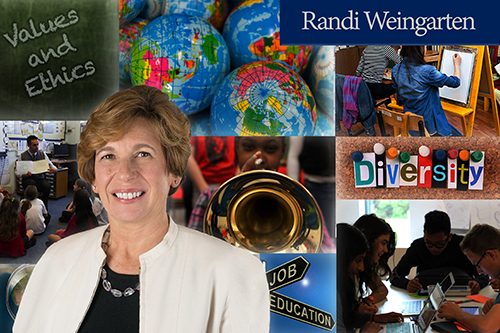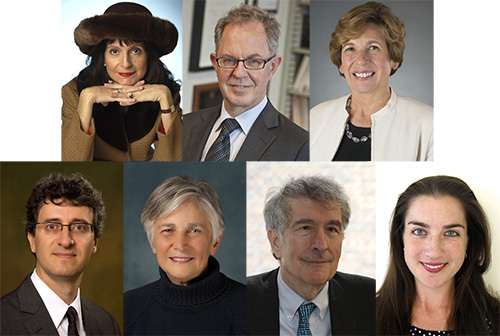
"If we could turn back the clock, we would like to have seen a greater emphasis on our biggest challenges--funding inequity, segregation, the effects of poverty. We would have welcomed a major expansion of high-quality early childhood education, and greater support for career and technical education and community schools."
-- Randi Weingarten
What will be the legacy of Race to the Top and Barack Obama's other education initiatives? Indeed, what's been accomplished in education reform around the country since 2012? Does our current traditional model of education meet the needs of most students? Is our curriculum preparing them for the jobs we need to fill in an age of globalization and artificial intelligence? What are the most critical needs for education leading up to 2030? Should tuition at public colleges and universities be free?
As the United States prepares to elect a new President this November, putting every student on a path towards a successful future should be required discussion at every presidential debate. This summer in The Global Search for Education, we bring back our popular 2012 Education Debate series and put these questions and others to thought leaders at the forefront of educational change. We asked Andy Hargreaves, Diane Ravitch, Howard Gardner, Randi Weingarten, Julia Freeland Fisher, and Charles Fadel to imagine they were Secretary of Education for the new administration. What are their answers to some of the big picture questions facing education and education reform?
Today we welcome Randi Weingarten. Weingarten is President of the 1.6 million-member American Federation of Teachers.
Randi, what will be the legacy of Race to the Top and Barack Obama's other education initiatives?
President Obama should get credit for ushering us out of recession with the ARRA. Although it included Race to the Top, which, combined with waivers, exacerbated the test-fixation under No Child Left Behind, President Obama and Secretary Duncan both acknowledged late in the administration that "there are too many tests that take up too much time."
If we could turn back the clock, we would like to have seen a greater emphasis on our biggest challenges--funding inequity, segregation, the effects of poverty. We would have welcomed a major expansion of high-quality early childhood education, and greater support for career and technical education and community schools.
That said, the Education Department is showing growing support for increasing the diversity of our teaching corps, focusing on the whole child and the need for a well-rounded education. And the administration worked with parents, educators, the broader education community and the U.S. Senate to create a reset through the Every Student Succeeds Act.

"We know that racism, and economic and language-based discrimination, despite many advances, still have very real effects in our schools and communities."
-- Randi Weingarten
Does the current state of our underprivileged school systems help foster radicalism?
I don't know if there is any empirical data to answer your question, but I'd argue we need to flip it around: What are we losing--for young people, for their communities, for our nation and for the world--by not providing every opportunity for their growth and success?
Most states provide less support per student for elementary and secondary schools than they did before the Great Recession. We know that, in low-income school communities, many students are at a disadvantage not only from fewer in-school resources but also from fewer out-of-school supports, ranging from adequate healthcare and child care to safe and healthy places--like parks and recreation centers--for students to play and learn after school. And we know that racism, and economic and language-based discrimination, despite many advances, still have very real effects in our schools and communities.
There are many inspiring examples of young people coming from such challenges to become activists on behalf of their fellow students and communities, to fight injustice, and to be the change they want to see in the world, despite many obstacles.
What has the U.S. as a whole accomplished since 2012 in the field of education? Given the shift in focus in the global education reform debate from the 3 R's to the 4 C's, what are the critical steps we need to take to produce a new education framework for the U.S.?
The passage of sweeping new elementary and secondary education legislation to replace NCLB is a major accomplishment, and it's one many inside and outside of Washington, D.C. had written off as impossible.
If implemented properly, ESSA has the potential to move our nation toward every public school being a place where parents want to send their kids, where students are engaged, where educators want to teach, where the curriculum is rich, and where there is joy in teaching and learning.
Whether this happens depends largely on how states and districts design their plans and assume the responsibilities that have been returned to the states, including standards and accountability, teacher development and evaluation, and interventions. States and districts now have a much greater role in determining the best approach to help schools that have been identified as needing additional supports or intervention.
Perhaps most important, states now have the opportunity to use a framework of indicators for school success that is far better aligned with the skills and knowledge students need to be successful in college, career, citizenship and life, rather than default to standardized test scores.
It's not about moving from the three R's to the four C's (communication, collaboration, critical thinking and creativity), but about infusing those skills and habits--not only in English and math, but in science, social studies and the arts, too. Project-based learning, portfolios and other performance assessments are great ways to demonstrate content knowledge as well as the four C's. The AFT is a member of P21 (the Partnership for 21st Century Learning), a coalition of education and business groups that helped put the four C's on the map.

"It's not about moving from the three R's to the four C's (communication, collaboration, critical thinking and creativity), but about infusing those skills and habits--not only in English and math, but in science, social studies and the arts, too. Project-based learning, portfolios and other performance assessments are great ways to demonstrate content knowledge as well as the four C's." -- Randi Weingarten
What toll does poverty take on learning opportunities? How do we begin to reduce its effect on students?
By 3 years old, there is a 30 million-word gap between children from the wealthiest and poorest families. Children living in poverty have higher absenteeism and dropout rates. Dropout rates of 16- to 24-year-old students who come from low-income families are seven times higher than dropout rates of those from families with higher incomes.
Schools in low-income communities are underfunded and under-resourced; therefore, students with the greatest needs are shortchanged. There are essential elements for our public schools to fully develop the potential of both students and educators. They should be centers of community, where students, families and educators work together to support student success. They should foster collaboration. Teachers need time to engage with colleagues--whether shadowing, mentoring, co-teaching or conferring. They need a voice in school decisions and to be trusted as professionals. Teaching is a profession in which capacity building should occur at every stage of the career--novices working with accomplished colleagues, skillful teachers sharing their craft, and opportunities for teacher leadership. Learning should be engaging. Testing should not be the be all and end all. All students should have a broad curriculum that includes the arts and enrichment. Students should have opportunities to work in teams and engage in project-based learning. And student and family well-being should be front and center. Today, half of the students in America's public schools live in poverty. Think of what that means--stress, hunger, uncertainty and countless unmet needs. The growing community school movement helps by coordinating partners and resources. Successful schools don't do just one or two of these things. They knit them together--and they amplify each other.
- Fully fund Title I.
- Broaden access to high-quality, affordable early childhood education.
- Equitably and adequately fund public schools by using a state education funding formula that takes into account student need, such as in California.
- And, since schools reflect our society, officials must address inequality in wages and access to high-quality healthcare.

"We have an obligation to provide a free public education to America's children. In fact, it is their right guaranteed by the constitutions of each of our states."
-- Randi Weingarten
How can we make teaching a more prestigious career? How can we entice better quality talent away from more lucrative careers and into classrooms? How do we retain good teachers and make sure they are where they are needed most?
Prestige begins with properly preparing, inducting, supporting, paying and respecting teachers. It includes ensuring teachers have the time, tools and trust they and their students need to succeed. And we need a higher bar for entry into the profession, along with much better support and mentoring for new teachers than most now receive. We laid this out a few years ago in the AFT's "Raising the Bar" report.
Teachers need voice--too many educational policies of the past decade have favored over-testing, narrow measures of progress, and managed instruction over teachers' professional development and professional judgment.
A poll released recently by TeachStrong found that nearly three-quarters of Americans believe teachers are profoundly undervalued in terms of how they are treated and supported. Providing support for prospective and new teachers can make it an attractive prospect, such as teacher residency programs in which aspiring teachers work under the tutelage of a master teacher for an entire school year. Poor working conditions are one of the top issues teachers cite for leaving the profession. Strong leadership is essential to the success of any school. Teachers need to know they will work on a team, and it is the team who will be responsible for the learning of their students.
How do we manage the competition for resources between public, private and charter schools?
In my opinion, this is the wrong question to be asking. We have an obligation to provide a free public education to America's children. In fact, it is their right guaranteed by the constitutions of each of our states. We should focus on what it takes to adequately resource a high-quality public education for all our students. The conversation should be about support and opportunity, not competition. Most parents want a safe, welcoming, high-quality public school in their neighborhood. The zero-sum game policymakers and profiteers would have us play in too many of America's cities and communities today is disgraceful and a diversion from our important task of making that goal a reality.

Top Row: C. M. Rubin, Andy Hargreaves, Randi Weingarten
Bottom Row: Charles Fadel, Diane Ravitch, Howard Gardner, Julia Freeland Fisher
(Photos are courtesy of CMRubinWorld)
Join me and globally renowned thought leaders including Sir Michael Barber (UK), Dr. Michael Block (U.S.), Dr. Leon Botstein (U.S.), Professor Clay Christensen (U.S.), Dr. Linda Darling-Hammond (U.S.), Dr. MadhavChavan (India), Professor Michael Fullan (Canada), Professor Howard Gardner (U.S.), Professor Andy Hargreaves (U.S.), Professor Yvonne Hellman (The Netherlands), Professor Kristin Helstad (Norway), Jean Hendrickson (U.S.), Professor Rose Hipkins (New Zealand), Professor Cornelia Hoogland (Canada), Honourable Jeff Johnson (Canada), Mme. Chantal Kaufmann (Belgium), Dr. EijaKauppinen (Finland), State Secretary TapioKosunen (Finland), Professor Dominique Lafontaine (Belgium), Professor Hugh Lauder (UK), Lord Ken Macdonald (UK), Professor Geoff Masters (Australia), Professor Barry McGaw (Australia), Shiv Nadar (India), Professor R. Natarajan (India), Dr. Pak Tee Ng (Singapore), Dr. Denise Pope (US), Sridhar Rajagopalan (India), Dr. Diane Ravitch (U.S.), Richard Wilson Riley (U.S.), Sir Ken Robinson (UK), Professor Pasi Sahlberg (Finland), Professor Manabu Sato (Japan), Andreas Schleicher (PISA, OECD), Dr. Anthony Seldon (UK), Dr. David Shaffer (U.S.), Dr. Kirsten Sivesind (Norway), Chancellor Stephen Spahn (U.S.), Yves Theze (LyceeFrancais U.S.), Professor Charles Ungerleider (Canada), Professor Tony Wagner (U.S.), Sir David Watson (UK), Professor Dylan Wiliam (UK), Dr. Mark Wormald (UK), Professor Theo Wubbels (The Netherlands), Professor Michael Young (UK), and Professor Minxuan Zhang (China) as they explore the big picture education questions that all nations face today.
The Global Search for Education Community Page
C. M. Rubin is the author of two widely read online series for which she received a 2011 Upton Sinclair award, "The Global Search for Education" and "How Will We Read?" She is also the author of three bestselling books, including The Real Alice in Wonderland, is the publisher of CMRubinWorld, and is a Disruptor Foundation Fellow.
